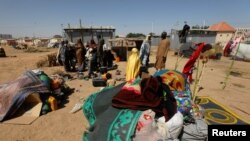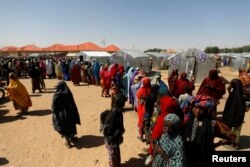The International Organization for Migration is appealing for $66 million to respond to an escalating displacement crisis, in northeastern Nigeria, which has left tens of thousands of people bereft of shelter and other basic life-saving needs.
Since November, more than 59,000 people have fled their homes in northeast Nigeria. Most of them, mainly women and children, have run from attacks by Boko Haram militants and other armed non-state actors in Borno State, the epicenter of the displacement crisis.
Recent violence behind latest movement
Fighting has displaced 1.8 million people since 2015. The U.N. migration agency's chief of mission in Nigeria, Frantz Celestin, said violence in the last two months of 2018 has triggered the largest movement of people in the shortest period of time over the past two years.
He said the escalating attacks and success in seizing towns suggest an increased sophistication in tactics by the armed groups.
“This is why I think a lot of people move once they take the town,” Celestin said. “Or even, in a lot of cases, in the case of Monguno, just a rumor of an attack can displace people ... because if there is a rumor that one of the non-state armed groups is about to attack, people would want to get ahead of it before they enter the town.”
Rann attacked twice in two weeks
For example, he cited the case of Rann, a town that was attacked on Jan. 14 by militants who burned tents and homes. Celestin said they even targeted clinics, hubs and compounds run by the U.N. and international organizations, including the IOM. He said no one was spared. He noted Rann was struck again on Jan. 27.
“In cases like this, the IDPs may want to get ahead of it because they are walking,” Celestin said. “If there is a rumor that somebody is about to attack, they may leave.”
Appeal for $66 million
In addition to security, Celestin said access to land in northeast Nigeria is the biggest problem facing the region. He said the latest influx of displaced people is creating a huge shelter crisis in the already congested camps, home to nearly one-quarter of a million people.
Celestin said thousands of people currently are exposed to the elements with no access to water and sanitation. The $66-million appeal, he said, will be used to provide emergency shelter kits, good water and sanitation, mental and psycho-social support to people in distress, as well as other essential non-food relief.
Boko Haram, which wants to set up its own Islamic State based on Sharia, or Islamic law, reportedly has killed more than 20,000 people and forced more than two million to flee their homes since the insurgency began in 2009.





